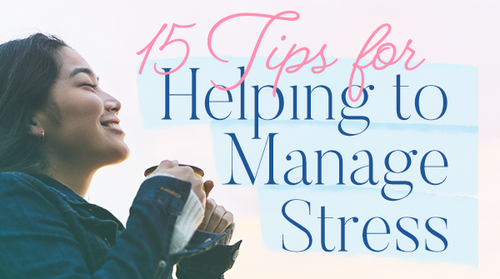Sometimes, the holidays aren’t just about decorations, presents and good cheer. For a number of people, the holiday season is also a time of extra stress.
It’s not hard to understand why. “The holidays often present a dizzying array of demands—cooking meals, shopping, baking, cleaning and entertaining, to name just a few,” says the Mayo Clinic.
In a survey conducted by One Poll, 77% of those who responded said they had a hard time relaxing at this time of the year; 59% described a typical holiday season as “chaotic.”
Fortunately, there are ways to make the holidays less stressful, allowing you to enjoy time spent with friends and family.
Don’t Hide Your Feelings
You may think that just smiling your way through stressful situations, no matter how you truly feel, is the best option. It’s not—confronting your emotions openly and honestly is the first step to feeling better.
For one thing, you might need to let go of your “ideal” holiday; for example, adult children may not always be able to join you. Learning to adapt as life changes can make things easier.
“If you're feeling stress during the holidays, it may help to talk to a friend or family member about your concerns,” says the Mayo Clinic. “You can't force yourself to be happy just because it's the holiday season.”
That’s especially true if you’ve lost someone recently or if circumstances won’t allow you to spend time with loved ones. The Mayo Clinic notes that “it's normal to feel sadness and grief. It's OK to take time to cry or express your feelings.”
You can try reaching out to such organizations as houses of worship, community centers or online support groups. The Mayo Clinic adds, “Volunteering your time or doing something to help others also is a good way to lift your spirits and broaden your friendships.”
Plan Ahead…And Control Your Finances
One way to calm the holiday jitters is by setting a schedule.
“Set aside specific days for shopping, baking, connecting with friends and other activities,” the Mayo Clinic suggests. “Plan your menus and then make your shopping list.”
“Formulate lists to help keep track of what needs to be done and when,” adds the Clarity Clinic, a Chicago-area mental health practice. “Checking items off the list can feel very rewarding.”
When creating a schedule, don’t allow yourself to become overwhelmed by the need to be everything to everyone. Focus on your most important tasks.
Planning ahead can also help ward off holiday-related financial worries.
Decide on how much money you can afford to spend on gifts, meals, etc. beforehand. Then track how much you spend: “Stick to the budget you agree with yourself, or your spouse, to set!” urges the Clarity Clinic.
See how you can reduce holiday expenses by examining your attitude towards gift giving; do you feel the need to spend a certain amount of money as a sign you truly care about loved ones?
As the Mayo Clinic puts it, “Don't try to buy happiness with an avalanche of gifts.”
Instead, you can:
- Make gifts yourself
- Give the gift of time; for example, offer to prepare an older relative’s garden come springtime
- Donate to a recipient’s favorite charity
- Start a gift exchange by putting everyone’s name in a bowl and having people draw names of gift recipients at random
Deal with Difficult Relationships
Some people feel that long-standing differences of opinion within families should simply disappear “because it’s the holidays.” That rarely happens.
Instead, keeping the family peace—and thereby reducing everyone’s stress levels—may require a conscious effort from you.
“Try to accept family members and friends as they are, even if they don't live up to all of your expectations,” suggests the Mayo Clinic. “Set aside grievances until a more appropriate time for discussion.”
If you do end up talking on a deeper level to someone you don’t agree with, try to:
- Remain respectful and kind; the other person is a relative, not an enemy
- Find things you can agree on and try to build a consensus around them
- Practice self-restraint; avoid becoming heated and reactive
- Not focus on changing the other person’s mind; instead, admit that you will simply agree to disagree
And remember that while you may not see eye to eye with a specific family member, you need to consider other people’s feelings as well.
In the words of the Clarity Clinic, “Avoiding the drama will make it more enjoyable not just for you, but for everyone who will be attending.”
Practice Basic Self-Care
It’s easy to let go of healthy eating and exercising habits during the holidays…which isn’t a good idea.
“Don't let the holidays become a free-for-all,” advises the Mayo Clinic. “Overindulgence only adds to your stress and guilt.”
For one thing, learn to say “no.”
“It is okay to not do everything, especially if you are overwhelmed,” says the Clarity Clinic. “Give yourself permission to not do everything.”
Positive ways to care for yourself include:
- Exercising every day
- Eating healthy meals, including healthy snacks and a glass of water before parties to avoid overconsumption
- Getting enough sleep
- Taking regular social media and news breaks; stay informed but not inundated
- Spending 15 minutes alone every day to focus and refresh
Learn How to Defuse Stress
Be aware of how you process stress. Do you experience muscle aches and headaches? Become crabby and irritated? Find it difficult to concentrate or make decisions? Tend to eat and/or drink to excess? Knowing your personal tension signs can signal when you need to step up your stress-reduction game.
For one thing, exercise doesn’t just benefit your physical conditioning; it’s also a world-class stress buster.
Exercise increases your levels ofendorphins, the brain's feel-good neurotransmitters (responsible for the euphoric feeling known as “runner’s high”), while reducing levels of stress hormones such as adrenaline and cortisol. (You can learn more about exercise and stresshere.)
Exercise can also help ease sleeplessness, a known contributor to both physical and emotional discomfort.
Other ways to defuse stress include:
- Taking up yoga, which combines meditative breathing with physical activity (you can find a stress-easing pose sequencehere)
- Adopting mind-body practices such as tai chi or meditation, which can help get your mind off your troubles and offset stress
- Tryingobjective recording: Draw a line down the middle of a sheet; label the first column “Negative Thoughts” and the second “Alternatives,” then fill out both columns
- Practicing deep breathing by inhaling slowly, letting your torso fill with air, then holding your breath for a few seconds before slowing exhaling
Finally, “seek professional help if you need it,” recommends the Mayo Clinic.
“You may find yourself feeling persistently sad or anxious, plagued by physical complaints or unable to sleep or face routine chores. If these feelings last for a while, talk to your doctor or a mental health professional.”
Like this article? You’ll love our weekly newsletter
sign up here!
**These statements have not been evaluated by the Food and Drug Administration. This product is not intended to diagnose, treat, cure or prevent any disease.









































































